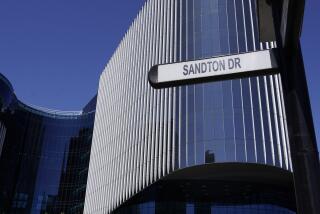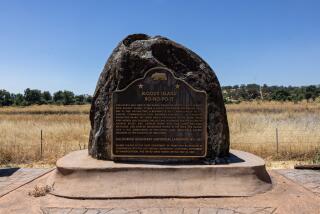Native Names Don’t Sound Sweet to Some S. Africans
- Share via
JOHANNESBURG, South Africa — Efforts to “Africanize” the names of this country’s provinces, towns and streets have stirred controversy among blacks seeking to break with a past marked by white domination and Afrikaners insisting that the moves amount to “ethnic cleansing.”
The latest flare-up came last month, when legislators voted to change the Northern Province’s name to Limpopo, the most popular suggestion from a short list submitted by the public. Several key towns and streets in the province have also been targeted for renaming.
Ngoako Ramathlodi, premier of Northern Province, said the changes are necessary to restore confidence among blacks and to help erase some of the brutal memories of African subjugation and colonial rule.
“Our sense of self-esteem suffered a massive blow,” Ramathlodi said. “Part of the task of the liberation struggle is to regain the humanity of the Africans, including their right to call themselves by their own names. What we seek and hope to achieve, is to elevate the status of the African to that of their fellow compatriots.”
But Afrikaner community leaders in the Northern Province said the move is “a kick in the face” that discriminates against white cultural interests. They are planning a civil disobedience campaign that could include withholding municipal property taxes and setting up alternative city councils in the province. Taxpayers’ money, they say, should not be used to fund the renaming project, which is expected to cost about 40 million rand, or about $3.6 million.
Afrikaners, earlier called Boers, are descendants of mainly Dutch immigrants who settled in South Africa in the 17th century. Many of the towns chosen for renaming had been named after Afrikaner generals, heroes and pioneers, as well as some of the architects of the country’s racist apartheid regime.
White rule ended in South Africa in 1994. Some fear that the name-changing exercise could undermine efforts to enhance national reconciliation.
“In the short term, it could cause certain groups to feel under attack, to feel disgruntled, to feel that the new order is there to wipe out their historical backgrounds,” said Thabo Rapoo, a senior researcher at the Center for Policy Studies, a Johannesburg think tank. “But in the long term, the names will probably start developing and growing on people, and they will adopt them.”
Supporters of the name changes also argue that the Afrikaners disregarded the traditional names of many areas when they dispossessed blacks of their land. The Boers also hurried to change names when they came to power in 1948 in order to remove the stigma of the previous British colonial era.
Limpopo is the name of the second-largest African river entering the Indian Ocean; although there is some dispute over the origin of the word, it is widely believed to come from an ethnic Ndebele or Sotho word meaning “river of the waterfall.”
The provincial capital Pietersburg, named for Afrikaner general Piet Joubert, is to be known as Polokwane, meaning “place of safety” in the indigenous North Sotho language. The northern town of Louis Trichardt, honoring the first “Voortrekker,” or pioneer, has also been targeted for an African name.
Voortrekkers were Afrikaners who left the country’s Western Cape region in the 1830s to escape British rule and the emancipation of slaves. Their harrowing Great Trek into the country’s interior is the stuff of Afrikaner legend, so stripping their names from the nation’s maps is seen as a serious affront.
“We are deeply offended and will not take this lying down,” Johan Willemse, provincial head of the Afrikaner Freedom Front, said after the name changes were announced. Northern Province is the third province to change its name, a process that requires the approval of the national Parliament. Pretoria-Witwatersrand-Vereeniging, or PWV, the province where Johannesburg and Pretoria are located, was changed to Gauteng in 1995. Eastern Transvaal became Mpumalanga the same year. Eastern Cape province has also indicated its intention to follow suit, and leaders are keen to find a name that reflects the progress the country has made under black majority rule.
Many roads and bridges across the country still carry names such as Daniel F. Malan, the first prime minister under apartheid, and Hendrik F. Verwoerd, another prime minister who instituted many of the most petty and repressive regulations against nonwhites.
“We have got to overturn this history and traverse a new course of historical orientation,” Joe Maswanganyi, Northern Province’s chief executive councilor, recently said.
Ramathlodi, the provincial premier, rejected claims that the cost of changing names would be prohibitive. He said a phased approach would be adopted to allow time to alter road signs, maps, notice boards and stationery.
“Those who argue that we have no right to use our own name because it is too expensive to do so, or it is an insult to their history, are missing the point,” Ramathlodi told the provincial legislature.
The issue has galvanized public debate, with South Africans across the board eagerly airing their views on public radio and in local newspapers.
“I have sympathy with the desire of a community to change the names of towns and streets that are dear to them. An indigenous name for Northern Province is long overdue,” wrote one reader, D.F. Van Tonder, in a letter to the editor of the Daily Citizen newspaper. “But please do not antagonize other countrymen in the process. Must I hide my head in shame every time the name ‘Voortrekker’ is mentioned?”
Many blacks, however, retort that the colonial names are a painful reminder of a history of oppressive practices, which runs contrary to the current political dispensation.
“It is sickening that almost eight years into black rule, entry into towns in our country is still characterized by statues of invaders on horseback, signifying the victory that is no more,” Mathatha Tsedu, a newspaper columnist and chairman of the South African National Editors’ Forum, recently wrote.
Afrikaner leaders accuse provincial politicians of using the renaming issue to whip up emotional support and deflect attention from other pressing issues that they have failed to tackle, such as unemployment, combating crime and developing the infrastructure. They warned that the move could backfire by heightening social tensions.
Other political parties have come out in support of the disgruntled Afrikaners.
“I believe there is a lot of racism attached to [the name changes] because all the Afrikaans names, even neutral names, like Naboomspruit and Nylstroom, have changed just because the old regime gave those names,” Willie Snyman, deputy leader of the Conservative Party, told a local newspaper recently. “There’s a lot of hard feeling.”
The largely Afrikaner New National Party called on the provincial government to rethink its decision. And the multicultural United Democratic Front and the predominately black African Christian Democratic Party have argued that the renaming project is an unnecessary waste of resources in a province that is strapped for cash.
“The changes are tantamount to dancing on the graves of our ancestors,” Willemse, the Freedom Front provincial leader, told reporters recently. “The Afrikaners who established civilized norms in this country over the past 3 1/2 centuries are kicked in the face.”
More to Read
Sign up for Essential California
The most important California stories and recommendations in your inbox every morning.
You may occasionally receive promotional content from the Los Angeles Times.














